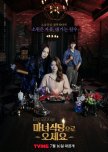
Incredible potential mostly unrealized
"Witch's Diner" tantalizes with its early promise and Song Ji Hyo's delightful portrayal of the titular witch. It's a wonderful character and Song Ji Hyo hits all the right notes. But the narrative fails to feature her until late in the series and, while it has other drawbacks, this shortcoming kneecaps the allure of "Witch's Diner".Despite that, some praise should be directed at the production crew in general. The set of the diner is outstanding. The special effects are top rate and the photography and sound are solid. Wardrobe has some major misses, but it's still a show that looks really good.
There's also some very nice guests spots by Kang Ki Doong, Park Jin Woo and especially Im Won Hee. The main cast and characters after Song Ji Hyo though are fairly stock variety. It's a show where the opportunity for multiple juicy characters around the witch is there. But the nice high school athlete, the female lead enduring hardship and the witch's familiar/sidekick just don't excite.
Things do ramp up late in the series especially as the character who is, if anyone is, the villain of this story reveals themselves. The resolution is too quick sadly and instead of a satisfying explosive climax, there's more of a slow fade. With the limited number of episodes, it would appear prime for at least one additional season. If there is, hopefully the witch has more friends. Or perhaps she just needs more entertaining ones. Then this could earn a recommendation, but not the current iteration.
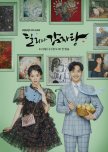
A pearl of a Mona Lisa (and some other bright spots) among some swine
First impressions are critical. Or at least the conventional wisdom is that they are. It certainly seems to fit in the world of casting. Some actors are put in the group that gets lead roles and others, despite the quality of their work, seem destined to toil in supporting and guest roles for the duration of their career. Until “Dali and the Cocky Prince”, Park Gyu Young was an actor that appeared to be a member in solid standing of the latter group. Conventional wisdom isn’t always a hard and fast rule though.As an actor who can move from one role to the next and completely remake themselves as an entirely new character with each iteration, Park Gyu Young has few peers. From ditzy and spoiled new office hire to beleaguered nurse with an unrequited love to musician turned monster fighter, she has played roles covering a vast spectrum of personalities and occupations and in different genres with almost unnoticeable overlap from one character to the next. Kim Da Li is not only unlike these previous characters played by Park Gyu Young, but there are scant comparisons with any characters. She’s quiet and curious and bright and mischievous and damaged and fierce and naive and, as the list up to this point suggests, complex. This actor and this role is an absurdly natural combination. Indeed, it’s difficult to imagine that anyone else could play Kiim Da Li and were anyone to attempt it, the production would likely come out very differently. From the standpoint of creating such a richly detailed character, the performance by Park Gyu Young is a massively successful achievement.
As for the story around her, Kim Da Li, after a chance encounter with Kim Min Jae’s Jin Moo Hak, she returns from abroad to Seoul to take control of the art museum formerly directed by her now suddenly deceased father. Her personal and professional lives get entwined with Jin Moo Hak. Meanwhile, a consortium is out to get the art museum and land around it for greedy, dark purposes and a former fiancee, Kwon Yool’s chaebol heir Jang Tae Jin, reappears with intentions to make amends. There’s plenty of plot and a somewhat large cast of characters that’s certainly adequate to fill out the standard sixteen episode length.
Somewhat tragically, a decision was made that these elements weren’t enough and that the show needed to be a romantic comedy with an emphasis on comedy. It’s a problematic strategy. The character of Kim Da Li acts very much as a central anchoring point which everything else revolves around. Park Gyu Young’s performance is consistent and outstanding throughout, but Kim Da Li, while many things, is not a comic character. That leaves the other players around her to fill in the humor and they are not up to the task. Whether it is Kim Min Jae, his secretary played by Hwang Bo Ra, his family or the museum staff, the comedy rarely works. Kim Min Jae tends to simply start bellowing and flailing his limbs during these painful sequences. The supporting cast tends to mug and pratfall and exaggerate and the sum of all it is a consistent misfire. Hwang Bo Ra, given the proper material, has proven that she has comedy skills. Some of the lesser known supporting cast (particularly the kitchen crew at Dondon), seem more than capable as well. But the script gives the actors precious little material leaving them flailing like fish out of water. It’s unfortunate as there’s some fine actors here. Not all of them are fine though and that exacerbates the script deficiencies. The performance by Lee Je Yeon as Jin Moo Hak’s scheming but incompetent stepbrother chiefly stands out for being unbearably poor.
When not trying to be a comedy that it is clearly not meant to be, however, “Dali and the Cocky Prince” is vastly more entertaining. When the macho, loud boasting and convulsive movements are turned off, Kim Min Jae is a marvelous partner for Park Gyu Young. And there are times when the Moo Hak takes a confrontational scene at a more subdued tone and it is terrific. These moments, the show gets serious traction. The story isn’t chock full of jaw-dropping reveals, but there’s enough intrigue and mystery to provide ample material for each episode. That Jang Tae Jin is who he is (despite a bizarrely bad hairstyle and some of the most poorly fitting business suits ever) also raises the enjoyment bar by a couple notches.
Further helping things by pitching in on the visuals, outside of Jang Tae Jin, the style team really nails it. Kim Da Li is iconic as a fashionable and powerful female.
Some of the other background work in the production misfires though. Some transitions are oddly timed. There’s some chase sequences that are pure filler. There’s never a point where a possible, credible alternative to the real not-yet-revealed villain is introduced to inject a bit of needed intrigue. And there’s a subplot setup around a museum intern that shows intriguing potential, but after a decent amount of screentime laying out the backstory, it’s hardly mentioned again.
As the show progresses, there’s just not a lot of mystery about where everything is headed. At one point a character actually exclaims, “How could the answer be so easy?” If that line pops up in a script and it seems like an accurate assessment, it should be a clarion call for some serious revisions. Despite the absence of any shred of uncertainty about who’s good or bad or really, really bad, it’s still a very good and entertaining show when Park Gyu Young is on screen (which is much of the time) and the comedy switch has been flipped to an “off” position. It is, however, an erratic enjoyment.
Recommended because Park Gyu Young turns in one of the finest performances of the year. With the strong ratings and the quality of the work here, she richly deserves more high profile roles.
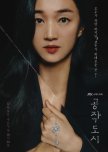
Deep, deep, deep down, there's something interesting here. But it's not much.
As the Winter Olympics are still in full swing as “Artificial City” comes to a close, there’s an interesting parallel that can be drawn. One of the sports that seems enticing from a thumbnail description is bobsled. Several people hurtling down a sheet of ice at unfathomable speed along a severely twisted course in a plastic shell strapped to a pair of steel blades. YES PLEASE let’s watch! Right? But other than the color of the sled and spandex, there isn’t a lot to distinguish a German bobsled run from a British one to even the Jamaicans. Same run. Same turns. Same ice. And invariably, the team that starts a tenth of a second behind in the first lap time winds up finishing about a half second behind at the end. Compared to almost any other team sport, there’s absolutely no strategy to differentiate one team from another. It’s just “run fast, hop in, don’t crash”. Once the novelty of the ice and the speed wear off, it’s a pretty lousy spectator sport.Chaebol dramas generally encounter similar issues. At first, everything is pretty: the people, the clothes, the bags, the cars, the houses and the locations. There’s the intrigue: corporate and political power grabs, succession rivalries, infidelities, children out of wedlock and corruption. It never hurts a drama to have a full plate of villains to stir up trouble and this genre is an overflowing geyser of troublemakers.
But there’s also only so many affairs and aging chairmen and shady secretaries and indiscreet affairs in swanky compounds before things start to get repetitive. First, there’s never a light moment. And the action is all plotting and scheming and keeping or revealing secrets but there’s little actual action itself that follows. And like the bobsled pinned into a defined track with only a single motivation (go fast), characters fit a narrow description: Buttoned-up. Restrained. Cautious. So there’s only so much variation to build in to one of these shows.
“Artificial City” makes no attempt to break these genre conventions. It centers on a corrupt conglomerate (Sung Jin) with an art gallery among other businesses, an unhealthy amount of political influence, an iron-fisted chairwoman (Kim Mi Sook’s Han Suk), her ruthless aide (Kim Joo Young’s Seon Mi), a reluctant heir (Kim Young Jae’s Joon Il) and a plan to make bank via the redevelopment of an area through questionable means. There’s plots. Backstabs. Affairs. Honest journalism is shut down. Prosecutors are used for corporate family gain. Vaults of secret information.
There’s only two elements of “Artificial City” that sets it apart by any amount - the characters of Park Soo Ae’s Jae Hee and and Lee Yi Dam’s Lee Seol. Jae Hee is the curator of the museum and husband to playboy corporate son Kim Kang Woo’s Joon Hyuk. She is determined to succeed by making him powerful and being his puppetmaster and protector. Lee Seol is an employee of the museum with a secret bad history with the Sung Jin family. Before long, the two develop a connection but Jae Hee’s desire for power and Lee Seol’s aim to draw blood can’t coexist harmoniously.
Of course the two are more connected than they realize and it’s a pretty solid effort by the production in how the pieces are revealed and put together slowly but unwaveringly through the show’s first half. And Lee Yi Dam, especially for an actor with hardly any filmography, and Park Soo Ae work together extremely well. The affection the characters have for each other is palpable.
Where “Artificial City” shines is where it isn’t really anything but a case study on these two main characters. To watch these characters develop - as they come to grips with whether the goals they have dedicated their lives towards remain meaningful or if new discoveries should set them on a new path - that is the hidden gem within “Artificial City”. And the performances by Park Soo Ae and Lee Yi Dam are strong; strong enough to give the production some bursts of powerful emotion.
But regardless of how meaningful character development may be, the hidden gem is far too hidden below everything else. And whenever the focus shifts off of Jae Hee and Lee Seol and their internal conflicts, things become less satisfying viewing-wise.
Not to mention that within the “everything else” there’s plot and logic holes EVERYWHERE. In one episode, Han Suk is damn near omnipotent and ruthless. The next, she’s somehow cornered and conciliatory. Secretary Go always knows where everyone is and is usually lurking in plain view but no one ever notices her. Worse, character after character knows that they’re a target but they make no attempt to be discreet. Or a character knows that this other character is a threat to their safety and happiness, but if they get a call from the danger, they don’t just pick it up, they go and meet the threat in person with not a single precaution. And then there’s the reversals where the weak character suddenly takes charge but it’s not at all clear what fulcrum was the mechanism to elevate them. Then again, it doesn’t really matter because regardless of the churning action on the surface, as soon as the movement pauses, nothing has really changed.
Does a scintillating production value or skilled direction help? Nope.
But it’s a great cast so that makes it worthwhile, right? There’s some strong work in spots here, but in general, ehh, not really.
So is it recommended? Well, if it’s twenty hours of bobsled on a loop or “Artificial City”, opt for the latter. But otherwise, it’s not a must watch.

Han So Hee punches her way to superstardom
Prior to viewing “My Name”, the question begging for an answer was “How is Han So Hee really going to play a character that is more brawl than beauty?” That question is answered so quickly and thoroughly to the affirmative in such short order that immediately after viewing the conclusion, it seems insignificant. It shouldn’t however, as Han So Hee’s performance is outstanding and it makes “My Name” one of the best productions of 2021. As Yoon Ji Woo who joins the Dongcheong drug gang and becomes the mole narcotics detective Oh Hye Jin, Han So Hee bludgeons the screen with desperate rage, crushing isolation and grim determination. If her credentials as an A List star weren’t already established, this performance carves it emphatically in stone.The story of a criminal enterprise planting a mole in a police department is not breaking new ground. The most notable predecessors are “Infernal Affairs”, the 2002 Hong Kong movie and its English adaptation by Martin Scoresese “The Departed” which won multiple Academy Awards. “My Name” has many similarities but the setup is an ingenious twist which is subtly hinted at multiple times but only fully revealed well past the halfway mark.
Beyond Han So Hee, there are two other marvelous performances. Kim Sang Ho is brilliant as the Narcotics Division captain with a murky connection to the murder of Yoon Donghoon which initiates the story. But the most electrifying work is by Yang Jool as Do Gang Jae, a former Dongcheong disciple with plans to take over as the new kingpin. Gang Jae is at the top of the villain heap - a tangle of psychosis, brilliance, theatrics and grudges. The entanglements between Ji Woo and Gang Jae are the finest moments in a very fine show.
Sadly, they are not the centerpiece and once Gang Jae is no longer involved, the tension markedly slackens. Where “My Name” lapses, it is with the finer points of how Ji Woo acts as Detective Oh, some lackluster characters, one casting misfire and a terribly unimaginative conclusion. For the lackluster characters, Ahn Bo Hyun’s Detective Jeon Pil Do varies from the cop stereotype only occasionally and almost imperceptibly. Park Hee Soon’s Choi Mu Jin, the Dongcheong leader is more corporate figurehead than ruthless drug lord. His right hand man, meanwhile, is Jung Tae Joo played by Lee Hak Joo who is entirely unconvincing in the role.
There are some questionable gaffes in logic. Ji Woo is far too reckless with maintaining her secrecy. It is a serious stretch that she is not quickly outed as a mole. One Bond-like near death escape around the halfway point is a mess. Dongcheong rarely seems like an outfit capable of either mass drug commerce, avoiding police entanglements or successful turf warfare against other gangs. Meanwhile, the entire narcotics division could fit in a walk-in closet and the secondary characters who inhabit it show no indication that they could apprehend the most simple minded criminals.
These are flaws but not so glaring to diminish the entertainment value. The production is overall very well done. The HMU work in particular is convincing. It’s not groundbreaking photography work, but it is solid. There is almost no filler or unnecessary flashbacks in the narrative.
With a satisfying conclusion, “My Name” would be in the top echelon of shows. That, however, is where “My Name” whiffs badly. In the final episode, there is a last shocking moment (a good one) and then the narrative veers immediately southward and never recovers. It is a final confrontation that magically combines a wholly unimaginative setup with a total departure from any possible realism. It results in a show that is nearly eight episodes of scintillating entertainment that is deeply marred by the last twenty minutes.
Overall, “My Name” is an excellent show that simply falls short at the end. For an audience that is not fond of violence, it should be avoided. In general, it is just short of being a “must watch”.
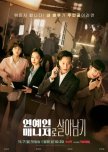
"Grab a brush and put a little makeup"
Some twenty years ago, give or take, an underground music genre exploded into public awareness. Emo became the hot scene with its ironic song titles, asymmetric haircuts, punk influenced guitars and melancholy, introspective themes. At the peak of its popularity, System of a Down released a blistering track titled "Chop Suey!" about drug addiction and death from their album "Toxicity". What does this have to do with the 2022 Korean television drama "Behind Every Star"? Ok, quiz time:Which of the following explains the commonality between the song and the show?
A. Toxicity is the name of the album and an accurate description of almost every character in "Behind Every Star"
B. "Grab a brush and put a little makeup" from the song also describes how the agents in "Behind Every Star" don't really solve anything. They just put a pretty facade on things and hope they go away.
C. The people responsible for both seem to have been heavily influenced by mind-altering substances, with differing outcomes for whether that was a good thing or not.
D. The tone and pacing of both cover the widest possible spectrum.
E. All of the above.
Answer below.
For those reading this review, please know that the song is excellent and to expect any return on the time invested in reading this review, please seek it out. It may not be everyone's style, but it is the absolute only hope to get any entertainment value from anything mentioned here.
Because it will not be found in "Behind Every Star".
It's part procedural drama with guest stars that are generally clients of Method Entertainment's agency. The agents have a more traditional serial arc. The procedural has some modest success with a few guest turns from the likes of Park Ho San, Oh Na Ra, Kim So Hyun and Kim Ji Hoon and more playing themselves as stars with various neuroses. The serial drama portion is a Category 5 hurricane of unpleasantness and odor and boor. Or bore? Both actually.
Seo Hyun Woo's Joong Don and Lee Seo Jin's Director Ma have absolutely zero charm, spine or energy. Kim Gook Hee's Eun Soo is a fairly significant supporting character that is entirely defined by her inexplicable attraction to Director Ma. Choi Yeon Kyu's Won Jae appears every episode multiple times but doesn't speak. Or perhaps he does, but it's meaningless filler. Hwang Se On's Hee Sun has the most potential of any character but her storyline alternates between a unlikely crush and an infinitely more unlikely series of acting misadventures. Shin Hyun Seung's Eun Gyul appears often. Has lines. Does things. Interacts with other characters. Things that should allow a viewer to obtain some impression or evaluation of what he might be like as a person. But he is so bland that absolutely nothing can be gleaned from observing him. He is as shapeless and formless and colorless as an inert gas.
Joo Hyun Young who made a minor character in 'Extraordinary Attorney Woo" into a viral online phenomenon does the opposite here - takes a major character and eliminates any sign of life from it. To her credit, the two portrayals are so incredibly different that it shows incredible range.
But the absolute rotting cherry on top of this reeking sundae is Kwak Sun Young's Je In. She is as self-destructive, shallow, selfish, shortsighted and superficial as any character that has ever leapt from writer's desk to screen. And all of it in a most uninteresting and grating manner possible. Even had the remainder of the show around her been praiseworthy, her presence alone would very likely have torpedoed everything she touched.
Apparently, "Behind Every Star" is an adaptation of a popular and successful French production. But it would be easier to understand the recent breakthrough in nuclear fusion than how this wreck of a drama is in any way associated with something that members of the human species sat through and enjoyed.
Not recommended. Answer to quiz: E

An exceptional work of craftsmanship from script to casting to direction to acting
“Those who do cannot remember the past are condemned to repeat it.” - Harvard philosophy professor George SantayanaSometimes we hear these phrases, like the one above and others, and they sound wise at first glance so we accept them as wholly and universally true. But if there is a whole and universal truth, it is much more likely that there are no whole and universal truths (except for, paradoxically, this one). “Our Beloved Summer” is a show about repeating the past - Woong and Yeon Soo having different values and backgrounds but loving each other despite them. In their past, the differences overcame them and they could not stay together.
Ironically, it was impossible for Woong and Yeon Soo not to remember their past as it was filmed in a documentary which remained popular into their adulthood. Can their familiarity with the past help them not to repeat it? That’s not really the issue though, whether for them or anyone else. Knowing the past but not recognizing how to change the present and future is useless.
The show isn’t built around the soundtrack like an idol drama, nor does it feature innovative or elaborate production design or wardrobe. But the crew for these elements were terrific. V’s “Christmas Tree” was one of many outstanding songs featured. The wardrobe for Woong in particular was stellar. And the locations where this show was shot were tops.
Woong is almost a polar opposite, on the exterior, of a typical male lead. Outwardly, he’s lazy and a coward. In the hands of a less talented actor than Choi Woo Shik, Woong could have been a disaster of a character and sunk the show. But this performance is mesmerizing and further solidifies Choi Woo Shik’s status as one of the most talented actors of any age and hailing from anywhere. That Woong is talented as an artist is made clear from early on but it is his inner emotional strength, that he will shrug off his own troubles and stand beside and lift up someone else who is suffering is where Woong really shines as a character.
If there’s a trope that “Our Beloved Summer” fails to avoid, it’s that if the two main characters had simply communicated openly and honestly with each other, they could have avoided many of their troubles. Well, hard to avoid here since the foundation of the story is that they’re separated after a five year relationship. But the show misses when it spends almost its entire first half focusing on the narrative primarily from Woong’s perspective. Yeon Soo’s inner thoughts are only momentarily illuminated until after the midpoint. The result is that she’s portrayed as an unapologetic bad guy between the two and Woong is the innocent victim. While the reality is that she did break things off, there’s much more nuance to Yeon Soo but it’s not revealed for a long stretch.
Once “Our Beloved Summer” delves further into Yeon Soo’s character, however, she comes alive as a layered character, tragically unselfaware while driven and loyal and smart. As the show proceeds, particularly in the final few episodes, Kim Da Mi’s portrayal gets better and better. She deftly alternates between lighter humorous scenes and raw emotional displays. There are probably examples of a finer pair of performances by both male and female leads in a production, but none spring to mind immediately.
The two secondary leads, unfortunately, do not leave the same impression. Kim Sung Chul and Roh Jeong Nui are both fine actors and perform admirably. The characters they play, however, are lackluster. Kim Sung Chul’s Ji Woong is an emotionally stunted friend of the main characters that is effective only briefly as a prop to move the arc forward between Woong and Yeon Soo. His own storyline is far and away the least compelling portion of the production. Meanwhile, Roh Jeong Nui’s NJ is an atypical idol with a crush on Woong. She has a brief but unnecessary subplot of her own that primarily just whets a viewer’s appetite for a return to focusing on any other part of the show.
An additional note is that “Our Beloved Summer” has one of the finest supporting cast ensembles of any show. If there is an easy layup in drama casting, it is to always, whenever possible, include Park Jin Joo as the female lead’s quirky bff. She’s as marvelous as ever here. But there’s standout performances as well from Ahn Dong Goo as Woong’s manager, Seo Jung Yeon and Park Won Sang as Woong’s parents, Jo Bok Rae as a senior television producer, Jung Kang Hee as a neighborhood hardware store owner and the sublime Kwak Dong Yeon makes several guest appearances as a fellow/rival artist to Woong.
Kim Yoon Jin nails how to handle the key emotional scenes. He lets the actors take over. The soundtrack takes a pause. There’s no moving cameras. The best example is the scene at the end of episode 11 where Yeon Soo struggles to find the words she wants to say to Woong. Technically, it is as simply presented a scene as a viewer will find. But it is an emotional powerhouse of a scene. Narratively, the show only strengthens as it nears its end. It continues to deliver humor, warmth and tenderness until its final moments.
If “Our Beloved Summer” were to be summed up in a single word, it would be warmth. We can all use more of that and so it is most highly recommended.

A not super homage of a superhero story
A rich guy in a powerful position with a vigilante hobby and a tragic backstory. A young protege' that lost his family. A wheelchair bound woman that's a whiz with computers. A coterie of corrupt men in power. A ambiguously good/evil female that to has a romantic interest in the rich guy. A city awash in crime.Figured out yet what story this is? So there's some surface-level differences but the similarities are too numerous to dismiss. It's not a fatal problem, but it does set a bar of expectations fairly high. It's a high-quality setup that requires excellence in execution.
The budget is definitely there. Ample sums of money have been spent here on special effects (lots and lots of fire and explosions and smoke). There's some big set pieces with lots of crowds. There's lots of fancy vehicles and a big house and the wardrobing is wonderful.
The majority of the cast is strong. Ji Sung clearly has the intensity and physicality to play Kang Yo Han. Among the supporting cast, Jang Young Nam, Baek Hyun Jin and Jeon Chae Eun stand out. Kim Min Jung pushes a bit much in to caricature than needed, but is passable. But Park Jin Young is the central character in the narrative and, while he's not the only issue with the character, he's not helping this production with his limited acting skill.
The fatal flaw of "The Devil Judge" is the character of Kim Ga On played by Park Jin Young. This is a show of intrigue. It's a deadly game of five dimensional chess where subterfuge and strategy are critical to survival. Kim Ga On, however, shows no traits that would make him useful in any conceivable way. Ga On doesn't control his emotions. He doesn't keep secrets. He doesn't conceal his intentions. When he attempts to dig up info, he is easily caught. He doesn't listen to simple directions. He is not only useless to someone playing in such a game, he's an obvious liability with no redeeming value. That Kang Yo Han has selected him among a legion of more worthy potentially useful allies to be his sidekick is inconceivably poor scripting. Yo Han is an unforgiving man bent on revenge and a brilliant tactician, but his choice as his wingman would struggle to outsmart an inanimate object.
Even more frustrating is that Ga On is the lifelong friend and object of affection for Park Gyu Young's Detective Yoon Soo Hyun. There's a backstory as to how they were childhood friends but it is entirely unconvincing as to why Soo Hyun has any feelings for Ga On. He has no apparent reason for not returning her feelings despite the fact that does actually like her. There are times when drama characters may not immediately become an item based on sketchy reasoning, but this is over the line of any credible basis.
There's more bad logic in the storyline here than needs to be reviewed. And it should be noted that entertainment or art in general should be permitted license to ask the audience to engage in some degree of suspension of reality. That's part of the point - to disengage from the stress and fatigue of our daily lives. But there's still a requirement that a story have solid footing. A line exists that should not be crossed. "The Devil Judge" crosses it and then sits fire to it and then salts the earth where it once lay.
As an aside, Park Gyu Young still deserves a leading role. It would be a bonus if it was on a show that didn't seem so bent on making her look as bedraggled as possible.

How to Make a Very Solid Breakfast Sandwich
"Love All Play" is like a hearty egg, sausage and cheese sandwich at a neighborhood diner. It doesn't take a culinary school trained chef or a Michelin star restaurant to plate a terrific one. But there are a couple of things that separate an average one from a very good one. First, there's no great sandwich without outstanding bread. It should be freshly baked. None of the spongy, preservative-stuffed, plastic-bagged tasteless kind. The eggs and cheese just have to be fine. But the sausage can't be. It should be spicy and savory with plenty of silky fats.In "Love All Play", the fresh bread is a bevy of likable, complex and organic characters from the two leads and going deep in to the supporting roster of characters.
The spicy meat is an astonishingly strong cast that has a few recognizable faces, but no high-powered stars.
Is the plot a brilliant, novel one with twists and turns and surprises and reveals and climactic moments? No. It certainly places enough credible obstacles in the way of the happiness of the various characters to keep a modest amount of tension going, but there's nothing here that hasn't been seen dozens of times in other dramas.
Is the production value on that viewers will confuse with Bong Joon Ho? That's a very firm "No.". There's a nice theme song and the editing is fine. But the badminton scenes are nauseatingly repetitive. The wardrobe is mostly athletic warmups. In fact, there's nothing in the production design, makeup, hair, lighting, sound, photography, etc. that's noticeable.
Despite such non-noteworthiness, Chae Jong Hyeop is an unfiltered delight as Tae Joon. It's hard to think of a more warmhearted, selfless, strong and mature male protagonist. In fact, if there's a less than credible moment, it would be where Tae Yang's father has any doubts about his character. Is he too good to be true? Perhaps, but there's enough of a self-destructive, reckless element to him that Tae Joon doesn't seem inhuman.
Park Ju Hyun may not have the natural charisma that Chae Jong Hyeop exhibits, but she's a marvelous complement. Park Ji Hyun is scintillating as her Jun Young has to be very delicately layered with resentments and damages and hopes and dreams. This review could list just about every other member of the cast and try to find some unique and effusive praise for each of them. If there is a weak member, it would be In Gyo Jin as an assistant coach who comes across too erratically from one scene to the next.
Special mention, however, must be made for Choi Seung Yoon and Jo Soo Hyang. They are [chef's kiss] pure, distilled magic in virtually every moment they are together on screen. If there is a spinoff of "Love All Play", it must be featuring these two. Or give them their own new concept.
It should be a simple formula. Wonderful, multi-dimensional characters with a solid cast and simply put them in a room and let them have at it. Unfortunately, those two ingredients are trickier than they look. Props to this production for accomplishing it with aplomb here.
Recommended and highly.
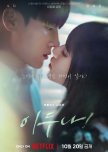
Like the title character at the beginning, it doesn't know what it should be
"I can't sing" says Doona when asked why she stopped performing but it's obvious that the issue is NOT that she can't sing. It's that she doesn't know WHY she is singing. And that after the years of training and performing, she's lost any meaning to what had once been her dream.That much is clear.
And equally clear is that a kpop idol interacting with Yang Se Jong's Won Joon is like a plunge in to an ice bath. He's such an opposite of her. He's beyond his years in maturity. He doesn't smoke. He's a rule follower. His emotions are as grounded as a concrete block building foundation. C'mon, he's a civil engineer. As a romance? Legitimately, there are some terrific, compelling scenes between Won Joon and Doona. But this is not a show where any rational viewer is expecting a fairy tale - they get together, leave the world behind and live happily ever after. Immediately upon solidifying their relationship, the clock begins audibly ticking before their troubles as a couple will consume them. Regardless of whether or not the lovebirds find a way to be together, the main issue that is dramatized is whether Doona falls for Won Joon because she needs someone and he's the one that happens to be there or is he legitimately her soulmate? But somewhat ignored is why has Won Joon fallen for Doona as a person? Clearly he's a straight male and she's stunning and seems interested in him and that should obviously be enough for a brief infatuation. It's not enough, however, to explain how he overlooks all the negatives (and there are many) in her and she becomes the only woman for him. So the romance is intermittently great but, in totality, is more just going where it was pretty expected it was headed from before the first frame hit the screen.
Moreover, the secondary storylines have promise. Park Se Wan and Kim Do Wan are a fantastic pair. Won Joon's got a potentially colorful hometown connections subplot. Ha Young's Jin Joo has a troubled family life. But the shorter episode run times and 9 episode duration don't give these diversions ample space to really fulfill what could have been. Park Se Wan, in particular, is wild and colorful but shows up halfway just as things in the main plot are gaining serious traction. Even just a single additional episode could have allowed more screen time to cultivate what were some potentially entertaining developments.
Where "Doona" really hits (and, in a way, misses) is that Doona herself is this fascinating, complex, damaged and brilliant character in the midst of discovering herself and her passion for music. And, for as much as no other man but Won Joon can make her happy, the reality is that not even he can come between her and who she is as an artist and a singer. It's her journey from being a woman in crisis to finding what within her gives her a purpose and meaning that captivates. How it misses is that it is clumsily obfuscated by the demands of the industry that she return to settle her contractual obligations and the effect that her return to singing has on Won Joon. These are certainly points worth noting in her growth, but they overwhelm what could have been a better exploration of her personal awakening, finding meaning in songwriting, realizing what she loved about performing and that a life without music, for her, would be a life without meaning. Instead, her internal development is captured in only brief moments. It's a pity.
Recommended but with forewarning that "Doona" isn't what it could be.
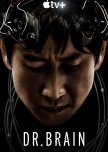
Unbelievably slick production & incredible cast let down by poor narrative elements
"Dr. Brain" has lots of indicators of a new player with dumptrucks of money ready to throw around in the genre. When it comes to readily available cash, no one other than a central government bank has as much as Apple. How does it work out? Well...Imagine a teenager that has just hit the lottery and he walks in a car dealer with a suitcase of large bills. Are they going to buy the practical vehicle with lots of seats and cupholders and storage or the exotic exterior with the fat tires and giant engine? Right, not the first one. And that's "Dr. Brain" in a nutshell.
When it comes to visuals, this show is off the charts. Although there's some scenes where the production design isn't elaborate, most of it is exquisite. The sets and props are tops. The lighting and color palette are stunning. It is a gorgeously shot show.
And the cast is just as phenomenal. Lee Sun Kyun, as Se Won, a brilliant but emotionally stunted neurologist, is excellent. Seo Ji Hye flaunts some serious detective cred. Park Hee Soon is wildly entertaining as an unconventional private detective. Lee Jae Won, Lee El, Kim Jeo Heon, Uhm Tae Goo and Moon Sung Geun comprise an ensemble of supporting characters that are as good as almost any show. The best performance, albeit unfortunately brief, is by Lee Yoo Young playing Se Won's wife who is convinced that their dead son is not, in fact, dead.
To watch almost any single scene in isolation would render an opinion that "Dr. Brain" is exquisite. But unfortunately the scenes must thread themselves together and this is where things don't add up to equal the sum of its parts. The overall plot is a mish mash of sci-fi/horror where Se Won has discovered how to link his brain to others, the catch being that they must be close to their death. As he links to others, when are his thoughts and memories his or and when are they those of someone that he's linked to? Is he himself anymore? It's an intriguing device and, at times, it works well, especially in the first couple of episodes.
But the show mostly limps through the second half as it unravels the facade that Se Won's life had been. Partly, it's because once the final confrontation happens, it feels like a step down in production value from the high bar it had set for most of the series. Also contributing is that there is a high frequency of rotation of characters opposite Se Won. Had either Seo Ji Hye's Lieutenant Cho or Park Hee Soon's Lee Kang Moo or Lee Jae Won's Hong Nam Il established themselves as The One Sidekick to Se Won, it would have resulted in a far better balance of personality with Se Won's natural introversion. Chiefly, however, the balance between the narrative in present day and the slow reveals of backstory through Se Won's brain links just ends up teasing far, far too long to get to the juicy, emotional parts. By the time the viewer gets ready to be emotionally engaged with cheering on the good guys and wanting real bad things for the bad guys, the final fx fireworks are about to go off (again in a sort of anticlimactic manner) and the show's over.
All the pretty camera work and stellar acting can't save a wonky storyboard basically.
Oh and the AppleTV app is wretched. For a bazillion dollar company with a reputation of creating user friendly interfaces, this is some of their absolute worst work.
Recommended? Meh. It's ok and it's only six episodes.

Turns out that Lindsay Lohan is a much better actor than we thought
And whoever directed "Freaky Friday" is a much better director than we thought.And whoever wrote "Freaky Friday" is a much better writer than we thought.
"Branding in Seongsu" is possibly the most baffling, unfunny, incoherent, inconsistent body swap production ever made. There's little evidence that a marketing or PR agency, even one completely consumed by office politics and romances, is a setting that provides much entertainment value. Or maybe one would be if the employees ever did anything but put together Power Point slides and prance around in badly fitting suits.
The characters go through unexplained wholesale changes from one episode to the next and that's even when it's possible to keep track of which person is in which body. Last episode - a naive and clueless spaz. This episode - a protege' of Machiavelli. Next episode - kind and sweet and empathic. Good. Bad. Mean. Nice. Angry. Sweet. It's crazy.
None of the cast really excels here. Kim Ji Eun who normally kills the lighter, comedic material clearly struggled how to approach playing multiple characters that meander through so many forms. Lomon certainly gets the stiff, bossy scheming side but otherwise is pretty lost. Kim Ho Young is probably skilled at something but it is not acting. Jeon Jun Ho presumably was directed to take his gay character as far over the top as possible and he does that. It's meant to be funny. It's not. But that's probably not the actor's fault. Chae Soo Ah is similarly tasked with playing a one-note social media addict. She plays that one note fairly well but it's still just the one note.
Yang Hye Ji, if anyone does, stands out a bit as there's actually a bit of an arc for Yoo Mi as a character - from unappreciated assistant to nefarious backstabber to rehabilitated colleague. It's not a believable arc but it's at least somewhat of a thicker than cardboard cutout portrayal.
That's it. Not a good show. Not recommended.

Toxic masculinity and accountability
D.P. mixes a cocktail of abuse, desperation and isolation. It's an extremely heavy subject and the production spares nothing to lighten the impact.It's dark. Not just a portrayal of a dark side of human nature, but almost every scene is shot in some degree of darkness.
There's an extreme amount of violence, blood, blunt objects, knives and guns.
Jung Hae In is a private from a dysfunctional family that finds kindred souls in the deserters that he's been charged with bringing back to the military. Koo Kyo Hwan plays the reluctant but clever senior soldier that provides the little bit of warmth and lightness to the show. Both play their roles very well. Jung Hae In, despite his youthful appearance, is far more natural as an actor in this role than his filmography would suggest. There isn't a weak performance in the show although when a lot of the dialogue is reciting a soldier's rank and name over and over again, maybe it's not the most challenging material. One performance, albeit brief, however that is scintillating is Go Pyung Po in a guest role in the first episode.
The storyline is somewhat disconnected as each of the first few episodes are self-contained around the pursuit of a particular deserter. Each deserter is a victim. The soldiers of their units are the villains. The D.P. are out to bring back the deserter to help that soldier before he irreparably harms himself. Each story has its own twist but the fact that all fit the same profile does lessen the impact as the series wears on.
Rather than generate a novel backstory for a deserter, the storyline coalesces around a single soldier over the final two episodes that builds to a climactic showdown. The downside to the buildup is that it adds this element of action to what had, up to that point, been a raw and fairly powerful view of emotional scarring. It's a context that begs for less moving parts and more quiet. Instead, it's a series of unreasonably unlikely events (cops that inconceivably don't call for backup, characters surprised that their cell phones don't work when they're deep in a cave, three characters in a car accident and it's the one without a seatbelt that walks away unscathed, etc.) that lead to the final confrontation which ends in a manner that is entirely unsurprising. The quality of the dialogue and the acting dip here too as the characters become more cliche. It absolutely dampens the impact that the show had been building. Instead of humanity, we get spectacle.
Certainly it's an ambitious concept and points should be awarded for making a show that won't make friends with anyone that looks unkindly at any criticism of the military. It gets a recommendation but D.P. should have been better.

How to Ruin a Timeloop Concept in the Finale aka The Dog Dies I Guess
Just in case the spoiler warning above was not noted, this review is almost nothing but spoilers for the final episode so be warned and proceed with the appropriate caution.Briefly, "A Time Called You" has eleven very solid, consistently paced, smartly acted, lushly photographed and skillfully directed episodes. Jeon Yeo Been is better as Jun Hee than as Min Ju. Ahn Hyo Seop is as good here as he's been in any show. He's not an easy sell as a teenager, but in K Drama Land, that's just the part of the terrain that we trod. There's some other nice casting for supporting roles. In fact, there isn't a below the bar performance to be found. It is somewhat disappointing that Seo Ye Hwa and Jang Hye Jin don't figure more prominently in the meat of the narrative. But that is somewhat made up for by Rowoon's cameo.
And props to the writers, director and editor for setting up the finale with a deft minuet between the time periods where characters are hopping back and forth. Although familiarity with the source material seems to have dampened some reviewers enthusiasm, having no such background found this production to be one of the more consistently enjoyable ones of recent vintage.
Until the finale.
The finale is when the timeloop malpractice bomb explodes.
Grievances:
1. A timeloop is already a do-over. Once you get a single do-over, that should be it. No do-overs of part of the first do-over. But after the excruciating exposition of exactly how Min Ju dies which is directly tied to Jun Hee's time travel, Jun Hee gets to try again and this time saves Min Ju.
2. Once Min Ju is saved, with the aid of In Kyu by the way, these two have about twenty seconds of resolution where Min Ju seems to have been won over by In Kyu and like everything is just jolly even though she was suicidally depressed earlier in the episode.
3. While Min Ju and In Kyu get short shrift, there are painfully extended scenes in the past era of Jun Hee in Min Ju's body and Si Heon traveling to and cavorting at the beach in the sand and in the water and watching the sunset. It's a necessary part of the narrative, but it feels like it consumes the entire second half of the finale.
4. Well, except for the showoff sequence of CGI dissolves that follows that goes on and on and on.
5. So the leads reunite for a moment of silence (yes, no words are exchanged in the street as the snow falls) and credits roll. It is quite the anticlimactic moment.
6. Where are Min Ju and In Kyu in this new future? No idea.
7. Did Park Hyuk Kwon's uncle character still open a cafe in Seoul? No idea. If he did, are the two leads somehow connected to it? Obviously no idea.
8. If nothing else in the future matters, why does it matter that Si Heon is now running a webcomic startup? No idea.
9. The real gear grinder is that of all the dramas where there is a completely unnecessary, unsatisfying and unconvincing rehabilitation arc of the villain at the end, this is the show where THE CONTEXT COMPELLED FOR SUCH AN ARC TO HAPPEN. IS Min Jin Woong's Oh Chan Young still a psychopath? Presumably Oh Chan Hee doesn't end up committed to an asylum, but his fate is completely left up to the viewer to determine. And as Oh Chan Young before the magic CGI dissolve had already killed the family dog before his journey via cassette to the past, we have no reason to think that he didn't still do it in the new post no-suicide-timeline. And since Chan Young killed the family dog, then that means that the family Mom is still going to freak out and since Chan Young is a psychopath, does Chan Young eventually move on to killing his mom? Is that how the universes balance out? Min Ju lives but Mrs. Oh dies?
But after careful consideration, the only conclusion can be that the dog is definitely dead.

A welcome diversion off of the beaten path but perhaps a bit too far
“The Sound of Magic” is very much not a typical Korean drama. It’s a bit of a musical although there are times when there are long elapses of time between musical numbers. It is a scant six episodes. It can’t completely leave behind school bullying, tiger parents, useless school administrations or class divides but its heroine and her journey are neither a Cinderella story nor a rehash of other familiar rags-to-riches storylines.A note before diving into the heart of things…
The Netflix influence is obvious here and it works well in some areas and very badly in others. The production value is phenomenal. The special effects are maybe not Hollywood summer blockbuster level, but they are as good as it gets in streaming. And this is a narrative that very much fits in a smaller number of episodes rather than the typical 12-20. On the other hand, the Netflix full season drop rushes the viewing process, increases likelihood of spoilers and deflates the suspense that should be building from episode to episode. This isn’t a new issue, but it’s not dissipating as Netflix makes further inroads in the genre.
Ji Chang Wook plays Ri Eul, a mysterious figure living in an abandoned amusement park. Why the amusement seems to be unsecured and intact allowing him to live there and anyone else to wander through it is never explained and perhaps that’s because no sane explanation could be invented. Same for why the local police seem to have hardly any awareness that it exists. Regardless, the script throws attempt after attempt to make him an ambiguous character but with uneven success. Despite some gaping logical holes though, Ji Chang Wook not only imbues the character with the Top Draw Talent Charisma but nails the quiet mysteriousness and elegant physicality of Ri Eul. Among his recent work, it is several steps higher in quality than anything else.
Choi Sung Eun has a more generic character as Ah Yi, a teen abandoned by her parents, living in poverty, picked on by schoolmates and with a firehose of bad luck aimed directly at her. It’s not whether she’s got things the hardest in this show, it’s whether a similar character from the industry can match her distress. Despite not breaking any new ground, Choi Sung Eun dispatches the song and dance numbers with aplomb, manages to keep an inner core of joy & hope deep down inside the character and never lets the bigger names in the cast push her presence out of the spotlight. There’s perhaps a bit of a missed opportunity that perhaps this actor could have taken a more complex and original character much further, but possibly that’s something for future roles.
Hwang In Youp completely switches gears from his most recent work to a bookish star student and it’s a mixed bag. He can pull off the young skinny kid with glasses look, but the macho baritone delivery that pops up on a fairly regular gives it away that this is not a natural thing for him. The character heads in an awkward direction too as his Il Deung is not quite an academic rival, nor a very good bff and not convincing as a boyfriend for Ah Yi while the short runtime doesn’t allow him to generate any meaningful connection with Ri Eul either.
Ah but the supporting and guest cast is magical. Im Ki Hong is always a delight. Choi Young Joon, Kim Hye Eun, Yoo Jae Myung and Yoon Gyung Ho sparkle. The standout, however, is Ji Hye Won as a classroom instigator that checks all the boxes for enmity without the over-the-top mustache twirling melodrama typical bully act.
Given the character sketches, the narrative setup is easily apparent. Ri Eul gives Ah Yi moments of relief from her dreary life. But is he for real? Director Kim Seong Yoon does a nimble tightrope walk between musical & fantasy & more generic teen coming-of-age slash the drudgery of present day reality and the desperate yearning for escape to a more magical world. He keeps the plot moving. There is plenty of tension buildup and cliffhanger suspense throughout. As for whether he nails the landing at the end, eh, it’s not entirely clean. Things don’t clearly resolve for anyone but one minor guest character. Maybe that’s more like real life and makes it better? Maybe but if so, then it’s perhaps not the musical or fantasy show deep down that it was advertised to be. Maybe it would have been better re-genre’d as a Nancy Drew or Scooby Doo teen mystery than a Roald Dahl musical fantasy.
Still, while the destination may not be Shangri-La and “The Sound of Magic” is likely an also-ran for any year-end lists, the journey there is a treasure with no shortage of excellent acting and production and a refreshing plot. Recommended and fairly strongly.

A simple show about a young woman navigating life. And it is a most extraordinary show.
Simplicity is one of the most confounding and elusive qualities in any context. Take a stroll through a supermarket and try to count how many brands of bottled water are on the shelf. It’s just water. They are just putting it in a bottle. But there are countless variations of it. Spring water. Sparkling water. Distilled water. That’s just some of the kinds. A product as common as an apple can be green or red and within each of those colors are multiple varieties each with their own combination of sweetness, tartness, firmness and suitability for eating raw or baking or to be used for cider or sauce. Simple things that somehow complexity mushrooms out of seemingly without end.“Yumi’s Cells” is, on its surface, a simple show: a young single woman navigates her career and personal life. The narrative device of animated cells, each of which are responsible for a particular trait of her personality, is intermittently inserted to illuminate her inner mental and emotional processes and how they manifest in her behavior.
While the combination of animation and live action may be novel (at least in Korean dramas), that’s not at all what is remarkable about “Yumi’s Cells”. That is not to say that the animation is not terrifically entertaining. It may not be Pixar quality work, but the cells are mostly cleverly written. The dynamic between the primary logical cell and emotional cell helps keep a bit of a de facto organizational hierarchy. The cells add more than a dash of humor and some of it is in moments where a bit of lightness is decidedly welcome. Done poorly, these segments could have been dead space fillers. But they instead both advance the narrative and entertain simultaneously.
The quality of the animated scenes, however, is secondary to the live action. The production here is perhaps not award-winning, but it has a lovely OST. The photography is well done. The wardrobe, particularly with Ahn Bo Hyun’s Wung, has some standout contributions. But this is, on the surface, a simple show: a young woman navigates her career and personal life. Massive amounts of cgi and a thundering score would be woefully out of place.
As for the supporting cast, its purpose is mostly to provide scenery as Yumi and her inner cohorts navigate daily life. Lee Yoo Bi stands out a bit as Ruby. Park Jin Young is mostly in a half catatonic trance as Yu Ba Bi, but that may be by design. But this is not an ensemble show and the ups and downs of the minor characters are barely on the relevance spectrum here.
“Yumi’s Cells” has three things that shine and shine brightly. One is the editing of each episode and how it so cleverly advances the narrative. No shows, or at least very very few, proceed through time in a straight linear fashion. All feature some manner of flashbacks or time skips or possible futures. Here, although there are flashbacks, it is more that the action is revealed not in a linear sense, but in increasing magnitude of importance. But it is done in a way which does not require a viewer to have a degree in quantum physics to follow. They are simple stories, but revealed in a complex manner. The storytelling is absolutely masterful. Concealed things are revealed at the most opportune time. The pace of how the story progresses within each episode never lags. And although it is a simple show, there is an incredible amount of suspense and it is so cleverly and slowly ratcheted up to a climactic moment. It is a simple show and it simply executes brilliantly.
In addition to the narrative, Yumi and Wung are not just immensely adorable, but they are painfully realistic and relatable. These are not chaebol heirs or hero cops or exorcists or genius orphans. They have anxieties and are emotionally scarred and don’t say the important things that they should say and they don’t always understand each other and they say part of what they need to say but never say the most important part of it and they hurt each other and they hurt themselves and they have all these flaws and, despite all of these things, they still find a way to intimately connect as human beings. And they struggle as two people intimately connected. It is one of the most honest depictions of a relationship in any medium.
The centerpiece of all of this is Ahn Bo Hyun as Wung and Kim Go Eun as Yumi. For Ahn Bo Hyun, this is new ground, both in terms of the personality of the character he’s playing and the magnitude of the role. If there is a theme in his previous roles, it’s testosterone with a side dish of not exceptionally intelligent. Physically, he’s not transformed beyond the hair and a few whiskers. Frankly, his impressive physique is one of the few out of place elements here. Wung is eating, hanging out with Yumi, eating and hanging out with Yumi or coding for hours on end. That distraction aside, Ahn Bo Hyun is a delight as the very left-brained, somewhat awkward but massively good natured and warm Wung. He has range. He has talent. And this is a role that suits him. Quietly, especially towards the end of this run, his depiction of a character who is lost internally but desperately trying to keep it buried is painful and lovely to watch.
As a swirling ball of earnest, bright, vulnerable and determined, Kim Go Eun is magical. She’s had no shortage of starring roles on blockbuster shows. But unlike those roles, here she’s the straw that stirs the drink. Not only that, but as the show is so deeply focused on Yumi, it is her performance that the success of the show largely hinges on. As the show delves deeper into Yumi’s character, Kim Go Eun’s portrayal grows more layered and nuanced. She hits all the notes in the emotional spectrum. She displays both speaking and physical prowess as an actor. The performance may not have a singular spectacular moment, but it is so uniformly deftly accomplished.
Separate, these two leads are wonderful. Together, they are indescribably transcendent. And the show as a result is a marvel.
Overall, it is a show - a simple show of a young woman navigating her career and personal life - that has seamlessly integrated exceptional lead performances and superb storytelling into a captivating package.
Recommended for everyone without any reconsideration, reservation or regret, as “Yumi’s Cells” is the most outstanding drama of 2021.


 1
1



















